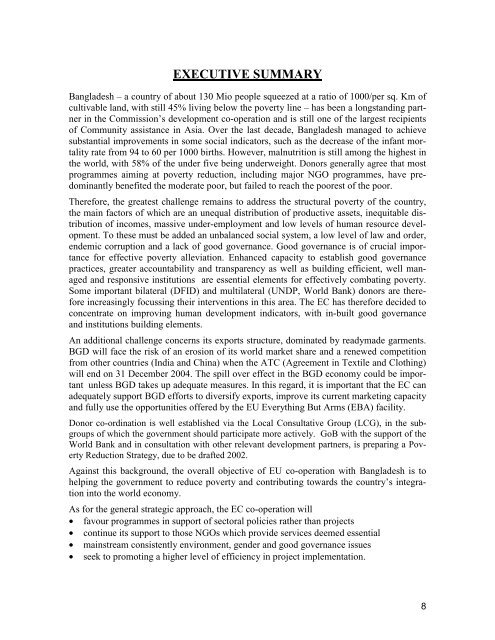EC Country Strategy Paper for Bangladesh 2002-2006
EC Country Strategy Paper for Bangladesh 2002-2006
EC Country Strategy Paper for Bangladesh 2002-2006
Create successful ePaper yourself
Turn your PDF publications into a flip-book with our unique Google optimized e-Paper software.
EX<strong>EC</strong>UTIVE SUMMARY<br />
<strong>Bangladesh</strong> – a country of about 130 Mio people squeezed at a ratio of 1000/per sq. Km of<br />
cultivable land, with still 45% living below the poverty line – has been a longstanding partner<br />
in the Commission’s development co-operation and is still one of the largest recipients<br />
of Community assistance in Asia. Over the last decade, <strong>Bangladesh</strong> managed to achieve<br />
substantial improvements in some social indicators, such as the decrease of the infant mortality<br />
rate from 94 to 60 per 1000 births. However, malnutrition is still among the highest in<br />
the world, with 58% of the under five being underweight. Donors generally agree that most<br />
programmes aiming at poverty reduction, including major NGO programmes, have predominantly<br />
benefited the moderate poor, but failed to reach the poorest of the poor.<br />
There<strong>for</strong>e, the greatest challenge remains to address the structural poverty of the country,<br />
the main factors of which are an unequal distribution of productive assets, inequitable distribution<br />
of incomes, massive under-employment and low levels of human resource development.<br />
To these must be added an unbalanced social system, a low level of law and order,<br />
endemic corruption and a lack of good governance. Good governance is of crucial importance<br />
<strong>for</strong> effective poverty alleviation. Enhanced capacity to establish good governance<br />
practices, greater accountability and transparency as well as building efficient, well managed<br />
and responsive institutions are essential elements <strong>for</strong> effectively combating poverty.<br />
Some important bilateral (DFID) and multilateral (UNDP, World Bank) donors are there<strong>for</strong>e<br />
increasingly focussing their interventions in this area. The <strong>EC</strong> has there<strong>for</strong>e decided to<br />
concentrate on improving human development indicators, with in-built good governance<br />
and institutions building elements.<br />
An additional challenge concerns its exports structure, dominated by readymade garments.<br />
BGD will face the risk of an erosion of its world market share and a renewed competition<br />
from other countries (India and China) when the ATC (Agreement in Textile and Clothing)<br />
will end on 31 December 2004. The spill over effect in the BGD economy could be important<br />
unless BGD takes up adequate measures. In this regard, it is important that the <strong>EC</strong> can<br />
adequately support BGD ef<strong>for</strong>ts to diversify exports, improve its current marketing capacity<br />
and fully use the opportunities offered by the EU Everything But Arms (EBA) facility.<br />
Donor co-ordination is well established via the Local Consultative Group (LCG), in the subgroups<br />
of which the government should participate more actively. GoB with the support of the<br />
World Bank and in consultation with other relevant development partners, is preparing a Poverty<br />
Reduction <strong>Strategy</strong>, due to be drafted <strong>2002</strong>.<br />
Against this background, the overall objective of EU co-operation with <strong>Bangladesh</strong> is to<br />
helping the government to reduce poverty and contributing towards the country’s integration<br />
into the world economy.<br />
As <strong>for</strong> the general strategic approach, the <strong>EC</strong> co-operation will<br />
• favour programmes in support of sectoral policies rather than projects<br />
• continue its support to those NGOs which provide services deemed essential<br />
• mainstream consistently environment, gender and good governance issues<br />
• seek to promoting a higher level of efficiency in project implementation.<br />
8

















